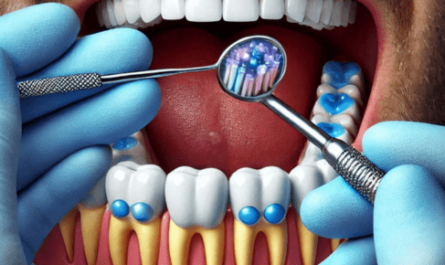
Calculus is another dental problem that is also known as tartar which if left unresolved may cause other grievous dental complications. Visiting a dental office in Summerlin often can assist in controlling tartar and if it develops may require expensive procedures.
Failure to maintain proper dental hygiene will result in hardening of the layer of bacteria known as plaque to something called tartar both of which are costly and detrimental to the teeth.
This blog will discuss the measures that one can take to prevent or reverse tartar formation while stressing that proper care can help you avoid a lot of money spent on dental treatment.
What Tartar is and how it is formed?
Tartar is commonly referred to as dental calculus, which is actually hardened plaque that accumulates on your teeth. Tartar is a hard deposit of bacterial material that forms a crust on your teeth. The bacteria in plaque act like a paint and eliminate minerals from the saliva depositing it on the teeth surface in the form of a film.
If it is not washed out by brushing or flossing, it becomes calculus or tartar for short. However, if tartar has formed then it has to be removed by a dental health expert. Salvia thus cites tartar as a factor that discolors teeth and contributes to gum disease including all other complications that may be related to the teeth.
It is essential to acquire knowledge about what causes tartar to grow, and ways of avoiding that, as well as avoiding the money pit that is paying for deep dental problems.
How Can Daily Oral Hygiene Help Prevent Formation of Tartars?
To avoid the formation of tartar, it is advised to brush your teeth on a regular basis. This is because plaque can easily be removed by brushing the teeth at least twice with fluoride paste and flossing at least once a day.
An antiseptic mouthwash can also be useful in reducing the bacteria that lead to the formation of plaque. The following are some of the primary strategies that can help you escape the cost of other elaborate dental procedures. Taking time to practice good oral hygiene is actually a worthy investment and will greatly help you in reducing your dental expenses in the future.
How Professional Cleaning Procedures for Tartar Can Be Performed?
Tartar poses a great danger to the teeth if it has formed on the teeth, then a dental cleanup is needed. While doing a tenure, a hygienist scrubs the teeth and uses some instrument to scrape off the tartar from the visible part as well as from the часть hidden beneath the gum line.
Teeth cleaning is crucial so that one gets rid of tartar and should be done on a regular basis for the sound health of teeth. Although there is always a price for these professional cleanings, it is always cost-effective if one wants to avoid more complicated dental problems that will certainly cost more. Cleanings also have potential benefits of early identification of disease processes and will therefore be cheaper in the long run.
How Can Tartar Buildup Prevention Contribute to the Saving of Your Money?
By avoiding tartar, one can maintain good hygiene, a balanced diet as well as dental appointments to lessen the chances of facing severe dental problems. Periodontal disease, tooth decay, tooth shedding, and other conditions that would necessitate expensive procedures if not treated are contributed to by the untreated tartar.
Through such measures, one can avoid falling into such an expense hence enjoying a nice dental formula without so much charges to the pockets. A healthy mouth is not only necessary in today’s society but also a wise move to make financially.
Conclusion
Tartar is one of the terrible things that form in your mouth and causes severe dental issues if not removed. It seems quite complicated; however, anyone can learn how tartar forms and how one can prevent it, so as to avoid these exorbitant expenses when the tartar is formed.
Tartar deposits are avoided by observing proper brushing and flossing, consuming appropriate nutritional food, and visiting a dentist to clean personal dental instruments. In fact, prevention is better than cure, and this stands true for oral care as you get to avoid the high costs that are incurred in the future.



